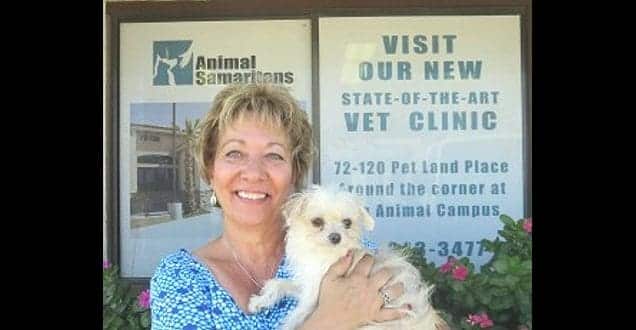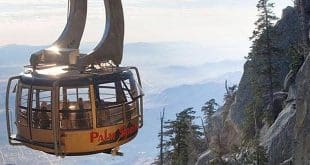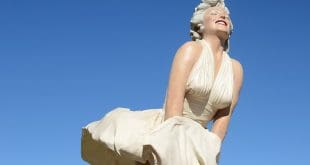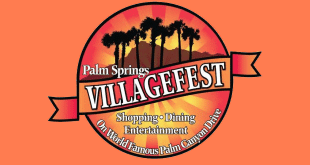Kim Laidlaw is the Executive Director of Guide Dogs of the Desert. For the blind, a guide dog means increased freedom, companionship and safety. Since 1972, Guide Dogs of the Desert has worked to connect people in need with the tools they require for success. Clients who are legally blind, come to the campus to learn how to work with a custom-trained guide dog, who can offer them safe mobility, loving companionship and the miracle of independence.
Kim grew up in Chicago, and a job opportunity brought her to California in 2003. While working for the Annenberg Center for Health Sciences, she started her guide dog journey as a weekend and event volunteer. Kim then became a Board Member, and in 2006 was appointed Director of Operations, then later became Deputy Executive Director with her focus on public relations, community outreach and marketing. In November 2013, she stepped into the position of Executive Director. Kim has also been a puppy raiser for the organization and now has an ambassador dog for the school, Rose.
Kim, it was so nice to chat with you and learn more about you and about your organization, Guide Dogs of the Desert. When was Guide Dogs of the Desert founded and what is your mission?
Kim Laidlaw: Nice chatting with you as well, Kate. Guide Dogs of the Desert was founded in 1972 by Mr. Lafayette “Bud” Maynard with the goal to provide individual custom-trained guide dogs to the blind and those with special needs. He began by training students one at a time from his home. With the help of the Cathedral City Lions Club, Guide Dogs of the Desert was incorporated and licensed under California State Law and the Department of Consumer Affairs. By 1975, the demand for guide dogs outgrew Mr. Maynard’s capacity to train from his home. At that time, Guide Dogs of the Desert leased a two-bedroom house with a detached garage located on the current school property.
In 1976, several individual members of Canyon Country Club in Palm Springs backed the purchase of the property and renovations commenced. The demand for specialized and custom guide dog training, and individualized instruction soon required larger facilities. In 1982, Lions Club members, local businesses and a grant from the Lions Club International Foundation served to expand the kennels and dormitory. The adjoining six acres was purchased to provide for future expansion.
Since 1972, Guide Dogs of the Desert has worked to connect people in need with the tools they require for success. From a simple ranch house in the desert, where originally one client and one dog were trained together, Guide Dogs of the Desert has grown to house and train up to 25 clients and custom-trained trained guide dogs each year at our campus outside Palm Springs, California. We’ve graduated more than 1,200 client/dog teams in our 40 years of service.
American Foundation for the Blind, every 7 minutes, someone in America will become blind or visually impaired. Our mission is to improve the lives of the blind by creating opportunities for life-changing independence, and by conducting community outreach and education programs.
How would you describe your job as Executive Director of Guide Dogs of the Desert? What would a typical day look like for you?
A typical day is getting to the office about 7:30am along with my three dogs, Rose, Belle and Sadie. During the season, which is when we have our classes, I will walk over to the dormitory and meet the individuals embarking on this life-changing experience before them—learning to work with their new guide dog.
It’s amazing to meet these individuals and to watch them grow. When they first arrive at the campus there’s anxiety and trepidation, but when they leave they walk with their head held high and have the confidence that they can conquer anything. Their guide dog opens up their world both with mobility and socialization. As one of our clients said, “Going from a cane to a guide dog is like going from a skateboard to a Ferrarri,” another shared, “With a cane you find obstacles in your way, with a guide dog, you never knew those obstacles existed.”
This is, without a doubt, the most rewarding job I have ever had.
Please tell us a little about your campus and grounds—I’d imagine they have to designed to accommodate both your clients and families and also the dogs themselves.
Guide Dogs of the Desert has a 12 bedroom dormitory. The rooms are simple, easy to navigate and each bathroom has a walk-in shower. There is a laundry room, computer room, and a community room (all furniture donated to us) where every morning the trainers meet with the clients to go over the days’ events. There’s also a dining hall where our clients eat their meals, and an auditorium where we hold graduations five times a year (September – May). Our clients and their custom-trained guide dogs are with each other 24 hours a day for 28 days in training.
We also have a kennel that houses 30 dogs and we are in the construction phase for a 6-run kennel to house our puppies in a separate facility from the big dogs (made possible by a foundation grant). We also have a wellness center (also made possible by a foundation grant) on our campus used for the health and welfare of our puppies in training, and dogs in for formal training. Notice a pattern, Kate. Donations are how we survive!
Are all of your clients legally blind or sight-challenged? Do you serve clients with other challenges as well?
Yes, all of our clients are legally blind; however some have additional needs. We also work with individuals that other schools may have refused service to—individuals living outside the “typical” urban areas, individuals who have physical challenges, who walk with a limp, are limited with motor skills, and who are also blind and mildly deaf. This school was built on the premise that every legally blind individual should have the opportunity to have a guide dog, including those individuals that have special needs. Because of this commitment to our special clients, we keep our class sizes small and focus on the individual needs of our clients, providing adaptive, custom-training for the guide dog selected specifically for them.
Our clients include those who have progressive diseases, such as macular degeneration, diabetic retinopathy, cataracts, glaucoma, and those individuals that have neurological blindness and finally, those that have lost their sight at birth or through a life altering accident.
Kim, you have a personal experience with blindness, as your grandfather went blind from macular degeneration. How did this experience effect you and your family? How much did this life event play into your decision to work with Guide Dogs of the Desert?
While in Chicago, my grandfather gradually went blind from macular degeneration; which, by the way, is a hereditary disease. I watched it first rob my grandfather of being able to drive, and then not being able to read the newspaper without a strong magnifying glass. For him, it represented the inability to be able to provide for his family. My grandmother became his sighted guide when they went places, but she didn’t drive. Therefore, they depended on other family members or friends to take them places and that was very difficult for him. He was a man that survived WWII and malaria, and now he was being robbed of his independence by this disease. It was difficult for us, as his family to watch him grow inward more and more each day, but it was much more difficult for him.
And you have your own special companion, Rose. She’s gorgeous! Tell us more about Rose, how you came to find one another, and her role as ambassador dog for the school.
I got Rose in March of 2004 at 10 weeks of age. I was thrilled, and everyone loved the little yellow ball of fur. I was going to raise her to be a guide dog to hopefully be placed with one of our clients. We went to speaking engagements, and other events to benefit Guide Dogs of the Desert. When Rose was approximately 10 months old, I noticed she wasn’t walking correctly. She needed to have surgery on both of her back legs, which kept her from being a guide dog. She did however have another job put before her—canine ambassador for the school. She is the perfect public relations dog. She loves everyone and everyone loves her! I am very blessed to have her in my life.
Kim, how do you receive the majority of your funding for day-to-day operations?
Guide Dogs of the Desert’s program includes breeding, puppy raising, formal training for the dogs, on-campus training, for our clients and their dogs, selected in-home training for our clients and dogs, and post graduate support. We are funded by individual donations, some corporate donations, and foundation grants. We do not accept any state or federal funding. All of our services are provided FREE OF CHARGE to our blind clients; we would not be able to continue providing the unique gifts that a trained guide dog brings to the blind without the support of our many friends and donors around the world.
On that note, I understand you have an upcoming fundraiser coming up in August, the Guide Dogs of the Desert Founders Club 19th Annual Summer Fling. That sounds like fun—please tell us more about that and how people can get involved.
The evening will include dinner and entertainment with a Hawaiian flair (5:30 Happy Hour – 6:45 Dinner). It is located on our campus at 60-735 Dillon Road, Whitewater, CA. There will be opportunity drawings and a silent auction. Dinner is either Hawaiian Chicken or Teriyaki Tri Tip. The event is limited to 180 people. RESERVATIONS CLOSE ON AUGUST 9, 2013.
This year our entertainment is provided by a client of ours, Cece, who will perform a number of Hawaiian dances for our guests. For more information, please contact Jim Klocek (909-215-7321) or Joy Stadler (909-592-1622).
Any other upcoming events or ways for the public to participate in your wonderful organization?
We have an annual Heroes Brunch that will take place on December 7, 2013. Last year we honored Betty White and it was held at the Esmerelda Resort and Spa. Plans are still in place for this year’s event.
We also have five graduations between the months of September and May, and other events throughout the year. They are open to the public and free of charge. Please check our website for details as to the dates. They are on Sunday and are always at 2:00pm.
Lastly, on April 6, 2014, Milauskas Eye Institute is hosting their annual “Help a Puppy Become a Hero” golf tournament at the Terra Lago Golf Resort. For more information about the event please contact Barb Kovacs (760-340-3937).
Kim, what is it that you love most about the community of Palm Springs?
There is so much beauty here in Palm Springs. I began coming to California as a teenager. My family had a lovely farm in Calimesa. Because of all my visits to the Coachella Valley and Inland Empire, I always thought this would be a marvelous place to live. The activity of Downtown Palm Springs is beginning to pick up and the people in Palm Springs are so friendly. Neighbors care about each other, and watch out for each other. The Palm Springs community is made up of such a diverse population and they are so philanthropic. I love it!
Thanks so much for chatting with me today, Kim, and sharing your mission and vision. Guide Dogs of the Desert is truly an essential organization, one that we are honored to have in Greater Palm Springs!
 Palm Springs
Palm Springs






Kim, This was a wonderful interview and you look great. I still think the idea of Guide Dogs of the Midwest is a good idea too